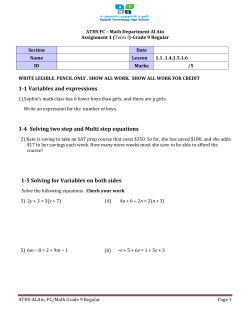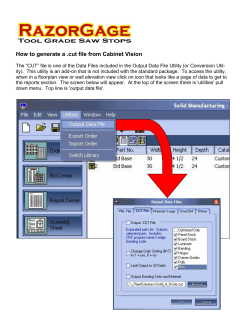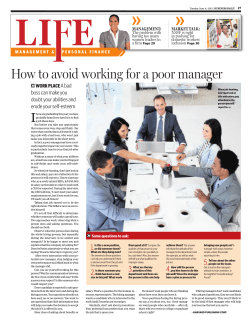
Budget Planning Instructions & Timeline
San Francisco State University Budget Preparation Instructions and Guidelines Fiscal Year 2015-16 Budget Process and Timeline Staff Analysis The Budget Administration & Operations department conducts preliminary analysis and prepares planning budgets. Planning Budgets Following review and consultation with technical budget staff, the Budget Administration & Operations department (Budget Office) develops a draft Planning Budget for submission to the President and Cabinet Officers as well as other officers reporting directly to the President. The President and appropriate staff develop Planning Budgets that are distributed to the major operating divisions of the University: Academic Affairs, Administration & Finance, Office of the President, Student Affairs & Enrollment Management, and University Advancement. Each division develop budget plans in coordination with their departments, which will be submitted to the Budget Office for review and may subsequently be discussed with the President. Final Budgets Adjustments to the budget plans may be required after the Governor has signed the State Budget Act. 1 2015-16 Budget Timeline The following is the timetable for the development of the FY 2015-16 University Budget: Staff Analysis November - January Cabinet Discussion January – April Planning Budget Distribute Planning Budget and Instructions April 24, 2015 Discuss Planning Budget, Training and Instructions with cabinet budget officers April - May Budget Plans submitted to the Budget Office May 22, 2015 Discussion with President and Cabinet Officers To Be Arranged Final Budget Approval of Budget Act (Governor’s Budget). The primary annual expenditure authorization as approved by the Governor and Legislature, including a listing of the Governor's vetoes. Revisions to Final Budget Late June or enactment of the Budget To Be Arranged 2 Development of General Fund Planning Budgets General The attached Excel file is a detailed itemization showing how each administrative unit’s allocated General Fund budget base evolved from the beginning of FY 2014-15 to the FY 2015-16 Planning Budget. This itemization incorporates all permanent changes made during the year for Cabinet approved new or expanded programs and/or compensation increases and adjustments that have been implemented to-date for FY 2014-15. It does not include funding for any “one time only” transfers from the University emergency/contingency fund during FY 2014-15, for programs that receive funding from CSU System-wide Provisions, or from other sources not permanently funded. The spreadsheets do not include funds for any program that is entirely self-supporting (e.g., College of Extended Learning & International Affairs, University Property Management, and Parking & Transportation). Central Expenses Expenditures for the following items are budgeted centrally for the campus and are not included in Division Planning budgets: Faculty/Staff Benefits Other Mandatory Costs 3 FY 2015-16 ANNUAL BUDGET PLANNING PROCESS 4 Instructions and Guidelines for Preparing FY 2015-16 General Fund Budget Plans General Submit your budget plans for FY 2015-16 in the completed spreadsheet files. The budget you have been provided includes, as of April 2015, listing of salary detail for 2015-16 and the line-item operating expenses detail submitted in 2014-15 and will need to be edited in order to balance to your 2015-16 allocation. Below are the steps you will need to follow in order to balance your budget. The following describes the layout of the Budget Office budget spreadsheets and associated tabs. Tab Descriptions Data Edit This is the only tab that should be edited. This tab contains salary data (as of April 2015) for your area and the operating expenses (OE) submitted for FY 2014-15. This tab contains everything you will need to submit your budget. For the “Budget Category” for the Data Edit tab, use the appropriate account description from the Account List tab (also see Appendix B). Dept Report This is a pivot table that will provide a summary of the budget submission to the department level. A right click to “Refresh” will update the data in the pivot table or from the menu bar, select “Data” and then select “Refresh All”. Please note to “Refresh” only, do not edit this tab. Area Report This is a pivot table that will provide a summary of the budget submission to the area level. A right click to “Refresh” will update the data in the pivot table or from the menu bar, select “Data” and then select “Refresh All”. Please note to “Refresh” only, do not edit this tab. 5 Report Detail This is a pivot table that will provide a summary of the budget submission to the position level and OE detail level. A right click to “Refresh” will update the data in the pivot table or from the menu bar, select “Data” and then select “Refresh All”. Please note to “Refresh” only, do not edit this tab. Summary - Universal Instructions Only edit ‘Data Edit’ tab. Pivot tables will automatically refresh with right-click “Refresh” or from the menu bar, select “Data” and then select “Refresh All”. You should not have to add additional columns in the ‘Data Edit’ tab. Pivot tables cannot be edited. Budget Component Instructions Salaries Salary estimates for all current employees have already been distributed. Use these estimates as the basis for your planning projections. Edit and revise the ‘Data Edit’ tab as follows: Adding New Positions Use an existing vacant position and if needed, update all columns highlighted in yellow. If no vacant position exists for new position, please submit a new position ETRAC and forward supporting documents to the Budget Office, or contact the Budget Office for assistance at ext. 81463. Insert short explanation in “Cabinet Comment” column. Refresh tables to ensure updates. Inactivating Existing Positions Replace last name with “Vacant”. Do not delete row. Adjust “base rate” column to zero. Insert short explanation in “Cabinet Comment” column. Other Salary Categories Student Assistants, Temporary Help, Overtime, Shift Differential, Lecture Pools and Post/Cert/Spec budgets have been populated using 2014-15 budget submission amounts and can be adjusted as needed. Note: Any positions with $0 FUNDING will be INACTIVATED. 6 Making Adjustments to Position Budget Examples – Original ID Last name First Name Job Code 900007118 Doe John 0420 FTE Base Rate 1.0 $ Salary Rate 5,162 Replace L/F Name $ Annual Budget 5,162 $ Adjustment 61,944 Final Budget $ 61,944 For example, make any adjustment necessary Revised ID Last name First Name Vacant Job Code 0420 FTE Base Rate 0.5 $ 5,162 Salary Rate $ 2,581 Annual Budget $ Adjustment 30,972 Also update the green “Cabinet Comment”’ column. Original Cabinet Comment Revised Cabinet Comment Vacated by John Doe reduced to .5 FTE Refresh tables to view changes. Do not include any estimates for staff benefits in the base planning budget. For additional information on editing salary data, please see Appendix A. Compensation increases for FY 2015/16 are not included in the salary base for each position. The collective bargaining process will determine the amount in salaries and benefits for each bargaining unit. Full-year costs negotiated for the FY 2014-15 salary increases have been included in budgets and salary projections if any. Operating Expenses As mentioned earlier, budget operating expenses from 2014-15 have been included in the spreadsheets. 7 Final Budget $ 30,972 Making Adjustments to Operating Expenses Adjust ‘OE Adjustment’ column to appropriate amount for desired Final Budget. Examples – Original Expense Type Budget Category Operating Expenses Supplies & Services Annual Budget OE Adjustment Final Budget 10,000 10,000 Revised with 8,000 printing Supplies & Services Expense Type Budget Category Operating Expenses Supplies & Services Annual Budget OE Adjustment Final Budget 10,000 (2,000) 8,000 If you need to add an Operating Expense Budget Category that is not shown in the account list, please contact the Budget Office at ext. 81463. Also update the green ‘Cabinet Comment’ column. Original Cabinet Comment Revised Cabinet Comment -2000 to balance Refresh tables to see changes. Stay within the Allocated Base Budget The budget plan for the area/department and cabinet must not exceed the FY 2015-16 Planning Budget target provided. Special Situations If you need to add a new department or new positions, please contact the Budget Office for assistance. 8 Budget Presentations Once completed, you should be able to print any of the reports for your records. The Budget Office will also produce a finalized version available in hardcopy format that will be consistent across all departments, areas and cabinets. There is no need to return hardcopies to the Budget Office and only balanced budgets will be accepted. Each Cabinet may be requested to present their respective budgets, as directed by the President’s Cabinet. For cabinet budget officers only: All budget plans (Excel files) are to be submitted to the Budget Office by Friday, May 22, 2015 using the shared directory “Files TO Budget Office/2015-2016” followed by an email to Budget Office (budget@sfsu.edu) and/or phone call notification to the Budget Office. Please include an Executive Summary indicating what is included in your budget and any other information you would like to highlight. Please contact the Budget Office at ext. 8-1463 for questions, clarifications, or assistance. 9 NON-GENERAL FUND AND REVENUE-BASED FUNDS 10 San Francisco State University Guidelines for Preparing FY 2015-16 Non-General and Revenue-Based Budget Plans General The Chancellor’s Office has delegated the financial responsibility for non-general and revenue-based funded programs to the University. It is essential for the University to review the status of these programs and their projected funding during the budget process. University self-support units include Student Health Services, Athletics, Campus Recreation, University Property Management, Parking & Transportation, and College of Extended Learning & International Affairs. The following describes the layout of the Budget Office budget spreadsheets and associated tabs. Tab Descriptions Data Edit This is the only tab that should be edited. This tab contains sources of funds, salary data (as of April 2015), estimated benefits, and operating expenses (OE) submitted for FY 2014-15. This tab contains everything you will need to submit your budget. For the “Budget Category” from the Data Edit tab, use the appropriate account description from the Account List tab (also see Appendix B). Fund Report This is a pivot table that will provide a summary of the budget submission to the fund level. A right click to “Refresh” will update the data in the pivot table or from the menu bar, select “Data” and then select “Refresh All”. Please note to “Refresh” only, do not edit this tab. Report Detail This is a pivot table that will provide a summary of the budget submission to the (if applicable) revenue, salary/position, benefits and OE detail level. A right click to “Refresh” will update the data in the pivot table or from the menu bar, select 11 “Data” and then select “Refresh All”. Please note to “Refresh” only, do not edit this tab. Area Report This is a pivot table that will provide a summary of the budget submission to the area level. A right click to “Refresh” will update the data in the pivot table or from the menu bar, select “Data” and then select “Refresh All”. Please note to “Refresh” only, do not edit this tab. Summary - Universal Instructions Only edit ‘Data Edit’ tab. Pivot tables will automatically refresh with right-click “Refresh” or from the menu bar, select “Data” and then select “Refresh All”. You should not have to add additional columns in the ‘Data Edit’ tab. Pivot tables cannot be edited. Budget Component Instructions Salaries Salary estimates for all current employees have already been distributed. Use these estimates as the basis for your planning projections. Edit and revise the ‘Data Edit’ tab as follows: Adding New Positions Use an existing vacant position and if needed, update all columns highlighted in yellow. If no vacant position exists for new position, please submit a new position ETRAC and forward supporting documents to the Budget Office, or contact the Budget Office for assistance at ext. 8-1463. Insert short explanation in “Cabinet Comment” column. Refresh tables to ensure updates. Inactivating Existing Positions Replace last name with “Vacant”. Do not delete row. Adjust “base rate” column to zero. Insert short explanation in “Cabinet Comment” column. 12 Other Salary Categories Student Assistants, Temporary Help, Overtime, Shift Differential, and Post/Cert/Spec budgets have been populated using 2014-15 budget submission amounts and can be adjusted as needed. Note: Any positions with $0 FUNDING will be INACTIVATED. Making Adjustments to Position Budget Examples – Original ID Last name First Name Job Code 900007118 Doe John 0420 FTE Base Rate 1.0 $ Salary Rate 5,162 Replace L/F Name $ Annual Budget 5,162 $ Adjustment 61,944 Final Budget $ 61,944 For example, make any adjustment necessary Revised ID Last name Vacant First Name Job Code 0420 FTE Base Rate 0.5 $ 5,162 Salary Rate $ 2,581 Annual Budget $ Adjustment 30,972 Also update the green “Cabinet Comment”’ column. Original Cabinet Comment Revised Cabinet Comment Vacated by John Doe reduced to .5 FTE Refresh tables to view changes. Include benefit estimates for salaries & wages in the base planning budget. Please indicate the benefits rate in the “Cabinet Comment” column. For additional information on editing salary data, please see Appendix A. 13 Final Budget $ 30,972 Compensation increases for FY 2015/16 are not included in the salary base for each position. Please be sure to include the 2% 15/16 planned GSI increase. The final percentage will be determined by collective bargaining. Full-year costs negotiated for the FY 2014-15 salary increases have been included in budgets and salary projections if any. Operating Expenses As mentioned earlier, budget operating expenses from 2014-15 have been included in the spreadsheets. Making Adjustments to Operating Expenses Adjust ‘OE Adjustment’ column to appropriate amount for desired Final Budget. Examples – Original Expense Type Budget Category Operating Expenses Supplies & Services Annual Budget OE Adjustment Final Budget 10,000 10,000 Revised with 8,000 printing Supplies & Services Expense Type Budget Category Operating Expenses Supplies & Services Annual Budget OE Adjustment Final Budget 10,000 (2,000) 8,000 If you need to add an Operating Expense Budget Category that is not shown in the Account list, please contact the Budget Office at ext. 81463. Also update the green ‘Cabinet Comment’ column. Original Cabinet Comment Revised Cabinet Comment -2000 to balance Refresh tables to see changes. 14 Revenues The Budget Office is available to provide assistance for student enrollment and fee revenue projections for FY 2015-16. Any area/department needing assistance, please contact the Budget Office at 81463. Budget Presentations Once completed, you should be able to print any of the reports for your records. The Budget Office will also produce a finalized version available in hardcopy format that will be consistent across all departments, areas and cabinets. There is no need to return hardcopies to the Budget Office. Each Cabinet may be requested to present their respective budgets, as directed by the President’s Cabinet. For cabinet budget officers only: All budget plans (Excel files) are to be submitted to the Budget Office by Friday, May 22, 2015 using the shared directory “Files TO Budget Office/2015-2016” followed by an email to Budget Office (budget@sfsu.edu) and/or phone call notification to the Budget Office. Please include an Executive Summary indicating what is included in your budget and any other information you would like to highlight. Please contact the Budget Office at ext. 8-1463 for questions, clarifications, or assistance. 15 Appendix A San Francisco State University FY 2015-16 ANNUAL BUDGET PLANNING PROCESS NOTES FOR THE SALARY DATA In general, you should edit the salary data and make planned changes for the 2015-16 Fiscal Year. The Budget Office is available to assist and answer any questions you may have and/or changes you want to make. Please contact Jack Mao at ext. 86621, Tiffany Cheung at ext. 82581, Rowena Manalo at ext. 53766, or Derek Trang at ext. 82834 with any questions related to the salary sheets. To expedite answering your questions regarding the salary sheets, please have the employee ID(s) or the position #(s) of the employee(s). Following are specific items to note: Permanent budgeted positions are included in these salary sheets. Prior year budgeted student assistants, temporary help, overtime and shift differential are included and can be edited. Compensation increases (if any) to-date have been incorporated into the monthly salaries, and the funding has been added to your planning budget. The salary data is from the Human Resources Management System (PeopleSoft). If there are any discrepancies with regard to salary, please check with Human Resources to verify/confirm the correct salary. Termination Date: Check for termination dates within the current fiscal year. If an employee will not be reappointed, then the position should be inactivated (or kept as a vacant position if permanent and budgeted, and you plan to fill the position). * Vacant Staff Positions: Positions show projected dollars at the minimum of the salary grade. Please fill in the planned hiring salary grade and dollars.* Vacant Management Positions: Vacant Management positions show zero projected dollars. Please fill in the planned hiring salary grade and dollars.* Vacant Faculty Positions: Vacant faculty positions show zero projected dollars. Please fill in the planned hiring salary grade and dollars. Also, for vacant positions shown, please include the search reference number. * For new position numbers, please submit a new position ETRAC and forward the supporting documents or contact the Budget Office for assistance. *There should be very minimal vacant positions listed in your budget submissions. If you do not plan to hire into a vacant position during the coming fiscal year, the vacant position will be inactivated; the available funds can be reallocated to other line items. DO NOT DELETE THE ROW. 16 Appendix B San Francisco State University FY 2015-2016 ANNUAL BUDGET PLANNING PROCESS NOTES FOR THE MINIMUM LEVELS OF BUDGETING FOR OPERATING EXPENSES This year all departments are asked to present their operational expenditures in some minimum level of detail. Please refer to the attached list: Expense Type Account Name Account Requisite Salaries & Wages President 601030 Y Academic Salary 601100 Y Department Chair 601101 Y Graduate Assistant 601103 Y MPP/Supervisory 601201 Y Support Staff Salary 601300 Y Overtime 601301 Y Temporary Help 601302 Y Student Assistant 601303 Y Teaching Associates 601304 Y Part Time Faculty 601806 Y Substitute Faculty 601807 Y Summer Session Fac. 601810 Y Shift Differential 601821 Salary Prepaid Expense 601824 Y Honorarium for Emp sal or ben Reimb. Release Time Salary 601827 Y 601828 Y 17 Optional Y 601829 Benefits Faculty Salary Reimbursement Benefits Utilities Group Electricity 605001 Y Gas 605002 Y Water 605004 Y Sewage 605005 Y Other Utilities 605090 Y Travel-In-state 606001 Travel-Out-State 606002 Y International Travel 606802 y Contractual Services 613001 Independent Contractors 613801 y Communication Telephone 604001 Y Library Library Materials 608001 Y Library Periodicals 608004 Y Subscription 608005 Y IT- Edp Eqp Purchase 616002 Y IT- Software Expenses 616003 Y CPO software update and support IT Hardware Non-Capital 616801 Y 616802 Y Software Non-Capital 616803 Y Deprec Equipment- Non Instr 619001 Y Instr Replace Equip- Deprec 619002 Y Non-Deprec Equipent- Non Instr Instr Replace Equip- NonDeprec Postage and Freight 619800 Y 619801 Y 660001 Y Printing 660002 Y Supplies & Services 660003 Y Training & Professional Development 660009 Y Travel Contractual Services Information Tech Group Equipment Group Miscellaneous Operating Expenditures 18 603XXX Y Y for NGF Y Y Operating Transfers Out Repairs and Maintenance 660021 Y Repairs-Earthquake 660022 Y Equipment Repair & Maintenance Space Rental 660927 Y 660800 Y Expenses-Other 660090 Y Bad Debt Expense 660040 Y Staff/Faculty Relocation Exp. 660042 Y Stipends 660804 Y Prior Year Admin Exp 660806 Y Transfer Out (1) 67XXX Y (1) Not allowed in CSU 485 Funds (CSU Operating Fund, Course Fee, Student Health, Orientation programs, Graduate Professional Fee program). A transfer in revenue 57XXX is recommended if a budget entry is process as Transfer Out. Every line item of the Minimum Levels of Budgeting (TABLE) does not necessarily apply to every budget unit on campus. This list is provided only as a guide to building a base budget. It also provides a shared format in which all university budgets can be presented, facilitating budget, consolidating and allowing for a more meaningful budget comparison. When building a budget, resources should be identified for every line item that represents a significant portion of the budget unit's overall expenditure plan. Some budget units will have a limited number of line items by benefit of their smaller size or the nature of their operations. Other budget units will have additional line items even to those listed here, due to their larger size and complexity. All expenditure items other than Salary & Wages and staff benefits are collectively referred to as Operating Expenses and Equipment (OE&E). The detail needed for an OE&E budget depends upon the size of the operating unit’s budget and the nature of its operation. However, all departments are asked to present their OE&E budgets as detailed as possible, at least by requisite categories. 19
© Copyright 2025









